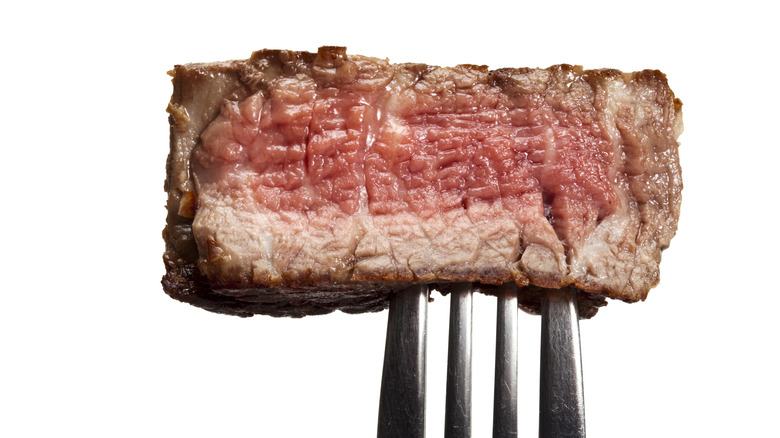Study Finds Possible Link Between Red Meat And Type 2 Diabetes
As Alvy Singer relents in the 1977 film "Annie Hall," "Everything our parents said was good is bad. Sun, milk, red meat ... college." It turns out, according to a study just released by Harvard T. H. Chan School of Public Health, he might've been onto something about the red meat.
Researchers found that eating just two servings of red meat per week could be linked to an increased risk of developing Type 2 diabetes. Further, the study concluded that the larger the quantity and greater the frequency a consumer eats red meat, the greater their personal risk increases.
The study (published on October 19 in The American Journal of Clinical Nutrition) followed 216,695 folks for up to 36 years. Every two to four years, the participants filled out questionnaires describing their daily eating habits, and by the end of the study, 22,000 of them had developed Type 2 diabetes. The findings indicated that people who consumed the least red meat were 62% less likely to have the disease than those who ate the most. For each "additional daily serving," the risk factor increased by 46% with unprocessed red meat and 24% with unprocessed.
This study provides current empirical evidence that adds to long-held concerns about red meat. But, what do these findings mean for Sloppy Joe night? Or the pot of chili at your next tailgate?
Rethinking daily dining habits
The Harvard researchers found that swapping red meat for plant-based protein alternatives like legumes and nuts lowered a person's diabetes risk by 30%. So, how much red meat is too much? As senior author Walter Willett explains, "Given our findings and previous work by others, a limit of about one serving per week of red meat would be reasonable for people wishing to optimize their health and wellbeing." That's just three ounces per week.
This recommendation carries a dramatic implication for consumers nationwide. As of 2021, 89% of Americans consider red meat an essential part of their daily diet. But, according to the CDC, 1 in 10 Americans (over 37 million) have diabetes, 90% to 95% of which is Type 2. Type 2 diabetes also increases a person's risk of developing cardiovascular and kidney disease, dementia, and even cancer. Another study published earlier this year suggested that eating red meat could also negatively impact digestion.
Reducing red meat consumption on a larger scale would also have environmental benefits like lowering greenhouse gas emissions and slowing climate change. Producing just one kilogram of red meat releases 36 kilograms of CO2 into the atmosphere. A previous 2020 Harvard study concluded that consumers "don't need to eat red meat" and that all the nutrients found therein can be obtained from different foods. Julia Zumano, R.D. of the Cleveland Clinic agrees, instructing, "Anytime you choose to have red meat, it should be the leanest cut you can find."

